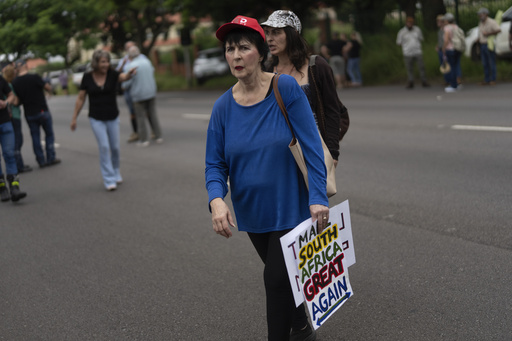
PRETORIA, South Africa — A gathering of white South Africans convened at the U.S. Embassy in Pretoria on Saturday to express their solidarity with President Donald Trump, while also asserting that they are victims of governmental racism.
A large crowd of demonstrators brandished signs proclaiming “Thank God for President Trump,” alongside other slogans that criticized what they perceive as discriminatory laws enacted by the South African government against the white minority community.
Many participants identified with the Afrikaner group that Trump highlighted in a recent executive order, issued just a week prior, which aimed to suspend aid and support to the Black-led government of South Africa. In his statements, Trump alleged that Afrikaners—descendants of predominantly Dutch colonial settlers—are being targeted by a recent law permitting the expropriation of private land by the government.
In response, the South African government has vehemently rejected the notion that the new legislation is racially motivated, claiming that Trump’s assertions are filled with inaccuracies and misinformation. Trump accused the Afrikaners of having their land forcibly taken, referring to them as “racially disfavored landowners,” even though no land has yet been seized under the new law. Furthermore, he proposed that Afrikaners be granted refugee status in the U.S., positioning them as just one segment of South Africa’s white minority.
During a recent address to Parliament, South African President Cyril Ramaphosa asserted that the forced removal of any group from their land would never occur again, a response rooted in the historical injustices faced by millions of Black South Africans during the apartheid regime and centuries of earlier colonial rule. “The people of this country know the pain of forced removals,” Ramaphosa remarked while clarifying that the land reform law does not permit arbitrary seizure, but instead pertains to land that can be repurposed for public benefit.
The criticisms and punitive measures directed at South Africa by the Trump administration have intensified an enduring struggle within the nation to rectify the long-lasting consequences of centuries of white dominance that marginalized the Black majority.
According to South African officials, the recently proposed land law aims to tackle the glaring inequalities in land ownership, highlighting that a significant portion of agricultural lands is held by white individuals, despite representing only 7% of the nation’s population.
The protesting white individuals displayed banners referencing the expropriation law as well as various affirmative action measures implemented since apartheid was dismantled in 1994, which aim to enhance opportunities for Black citizens. These initiatives, often referred to as Black Economic Empowerment, have been contentious for some in the white community.
Notable Trump adviser Elon Musk, who has South African roots, has long been critical of the government, labeling it as anti-white, although some people have questioned his motivations. He recently encountered roadblocks in securing a license for his Starlink satellite service in South Africa due to failing to meet the country’s affirmative action requirements.
Despite the ongoing racial tensions, South Africa has made notable strides in reconciling its diverse populace in the post-apartheid era. The current government operates as a coalition comprising both Black-led and white-led political parties working collaboratively.

